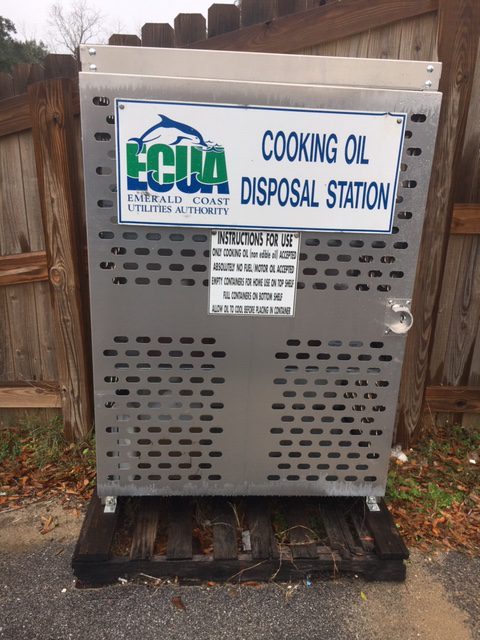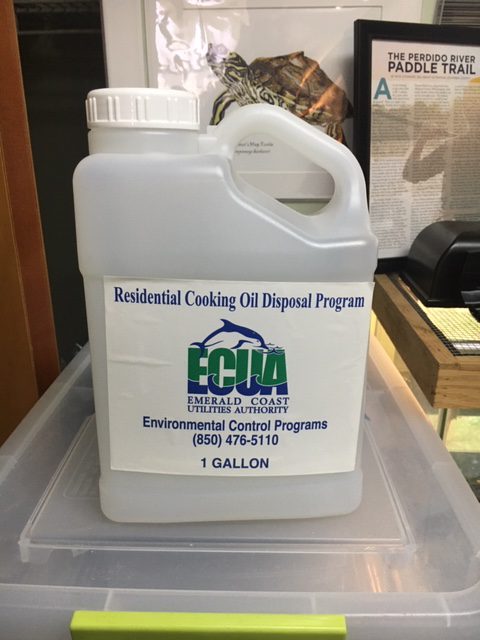It seems odd that we would be talking about maintaining your sewer system; that was a selling point to convert from septic. But there are things we do that can cause clogs in the lines that initiate what we call Sanitary Sewage Overflows (SSOs). These overflows can overflow into your home and into the street, entering the stormwater systems leading to our coastal waterways.
How you can prevent this is pretty simple – watch what you pour down your drain. After visiting one sewage treatment facility in Georgia, we were told by the plant manager “If you tell the public one thing… tell them to quit pouring bacon grease down the drain”. He then held up a pipe from their system that was 80% clogged with bacon grease. All fats, oils, and grease poured down the drain eventually solidify and form clogs. Recently they have found that milk solidifies as well. You should avoid pouring all of these products down the drain.
So, what do we do with it them?
In Escambia County, the local utility provides a free service to deal with this they call the FOG Program (FOG – Fats, Oils, Grease). They provide large metal cabinets outside locations around the community. Inside, there are 1-gallon plastic containers. You take one home. Fill with your fat, oil, and grease. Return it and get a new one. They take these oils back and covert them into biofuels. It is very similar to the propane system for your BBQ grill – and often found at the same place – but the difference is that there is no charge. If you live in Escambia County, you can find the FOG dispensary cabinet closest to you at ECUA FOG. If your county does not offer this service, encourage them to do so.

Another issue that has caused SSOs is the flushing of “flushable wipes” and similar products. They are “flushable” but not “degradable”. There was one report from London of a ball of flushable wipes equivalent in size to one of their buses found in the city sewer system. I have seen signs in public restrooms that say “flush nothing but toilet paper” – and that is good advice.

And there is one other thing that you, the property owner, can do to help reduce the chance of leaking sewage into our waterways – maintaining your laterals.
Laterals are the pipes extending from you house to the sewer system under the street. Maintaining these are the responsibility of the homeowner, and most do not – or may not know it is their responsibility. Newer developments should have laterals in good shape, older ones should be inspected. I live on an older community in Pensacola. Many of the houses in our neighborhood were built in the 1930s, some in the 1920s. The laterals were made of terracotta, or something similar. They have cracked and filled with roots and dirt over time. There is certainly leakage ongoing, and the homeowner may not even know it.
This past summer we had a sewage backup. We called a plumber who first recommended scoping the laterals. This involved sending a television camera scope down the line. We found that half way between our house and the street it was relatively new PVC line. From the halfway point to the sewer line in the street, it was old terracotta. The sad part of this was we had paid a contractor to replace the terracotta to the street – they only did half. You would say this fell on the contractor to fix, but that contractor was no longer in business – if fell on us. We paid to have the rest of the lateral converting to PVC, we are now good.
The point of this story is two things… (a) many have never had their lateral surveyed, you should to make sure all is good. This is not only good for the environment, but also will save costly repair bills down the road. (b) Just because you paid to have to have it repaired does not mean it was. I recommend you use a certified, well known plumber to check and, if needed, replace/repair your line.
If the property owner will consider, and act on, one of the following three this can reduce the health advisories issued in our coastal waters significantly. We encourage you to do so and educate your neighbor and friends to do the same.
- If on septic, develop and enact a septic tank maintenance plan.
- Convert from a septic system to a sewer system.
- If on sewer, have your laterals inspected, do not pour fats, oils, grease, or milk down the drain, and do not flush flushable wipes or similar products.
If you have further questions, do not hesitate to contact your county extension office.
- Rattlesnakes on Our Barrier Islands; Part 5 – Reproduction - January 12, 2026
- Rattlesnakes on Our Barrier Islands; Part 4 – Thermoregulation - December 29, 2025
- Rattlesnakes on Our Barrier Islands; Part 3 – Envenomation - December 22, 2025
